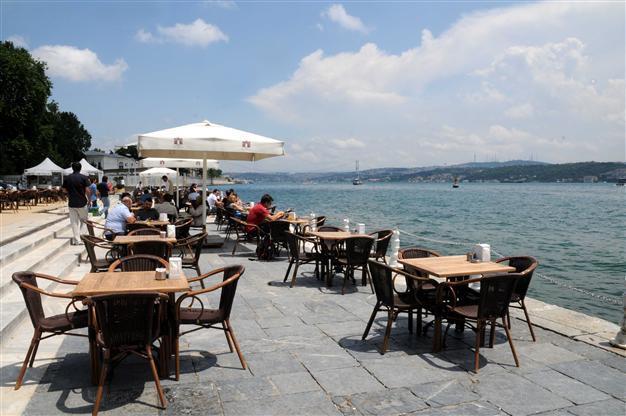Syrian refugees in Turkey start to work in service sector
Eren Güler ISTANBUL

People sit at a cafe in Dolmabahçe district of Beşiktaş in this file photo. Along with Taksim and Ortaköy, the center of the Beşiktaş neighborhood is where many Arab tourists visit and Syrians are employed accordingly. DAILY NEWS photo
As Turkey keeps receiving more Arab tourists, Syrian immigrants in the country, whose number have exceeded 1 million, have started to show up in the service sector, particularly tourism, thanks to their language abilities.
Small shops in Ortaköy, one of the main tourist attractions in Istanbul, for example, are employing Syrians to give a boost to trade. Shopkeepers at the landmark district by the Bosphorus estimate the number of Syrians employed in the small area to be around 250.
Many people who fled from the civil war in the neighboring country have spread across the country as the camps in Turkey’s south fail to meet all of their needs.
Syrian immigrants were mostly employed at manufacturing industries, small producers and agriculture initially, mainly because they requested moderate salaries. Most are not registered and do not hold a residence permit.
Istanbul received 712,000 Arab tourists in just the first five months of the year, some 16.6 percent up from the figure a year earlier. And it is only the beginning of the high season in the city.
In the Taksim area, the heart of entertainment in the city, menus and store signs in Arabic are becoming more prevalent. Many real estate firms also employ Arabic speakers. Along with Taksim and Ortaköy, the center of the Beşiktaş neighborhood is where many Arab tourists visit and Syrians are employed accordingly.
Muhammad, a 23-year-old who works as a waiter in Ortaköy, has told Hürriyet that he came to Turkey five months ago. He said he had switched to the Free Syrian Army from Bashar al-Assad’s regular ranks.
“Unfortunately, very bad things happen in war,” he said. “Your friends die before your eyes or are wounded. This is hard to stand. Me and my brother left our guns and entered Turkey illegally.” Still, a part of his family is in Damascus, he said.
Muhammad earns 1,000 Turkish Liras monthly, 100 less than his brother, who makes around $1,100. They live in the same flat and are preparing to save some $10,000 to move the whole family to the city.
Veysel, a former electricity technician, is paid 1,200 liras per month at a small store that sells souvenirs and was provided with a work permit.
Murat Mustafa Yavuz, the social security official in the central Anatolian province of Konya where 40,000 Syrians live, warned businesses July 4 that the fine for illegally employing foreigners was 10,000 liras.
Turkish Tradesmen’s and Artisans’ Confederation (TESK) head Bendevi Palandöken also said illegal Syrian employees were a burden for the economy.
